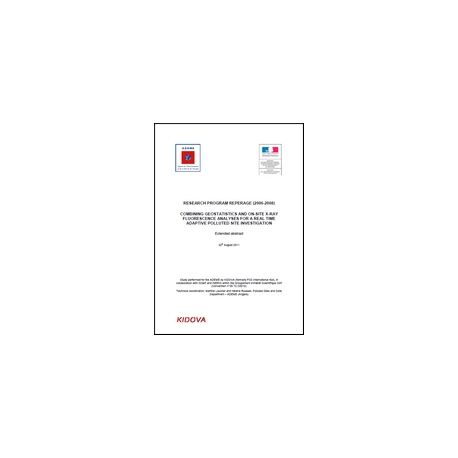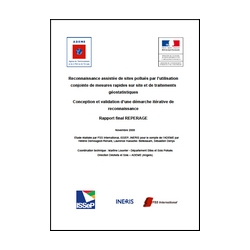 Agrandir l'image
Agrandir l'image
Combining geostatistics and on-site X-ray fluorescence analyses for a real time adaptive polluted site investigation
Extended abstract
Neuf
"How to improve the characterization of contaminated sites?"
Combining field analyzers and geostatistical methods allows to meet this expectation. Site investigations can be carried out faster and be rationalized. A coupling approach was designed in that purpose within the research project REPERAGE. A computer code was developed to test it on[…]
Plus de détailsFiche technique
| Auteurs | KIDOVA, ADEME |
| Public(s) | Bureaux d'études |
| Thématique | Urbanisme, territoires et sols |
| Collection | Hors collection |
| Date d'édition | 2011/08 |
| Nb. de pages | 26 P |
| Format | pdf/A4 |
| Langue | EN |
| Périmètre de publication | National |
En savoir plus
"How to improve the characterization of contaminated sites?"
Combining field analyzers and geostatistical methods allows to meet this expectation. Site investigations can be carried out faster and be rationalized. A coupling approach was designed in that purpose within the research project REPERAGE. A computer code was developed to test it on a reconstructed real case study (Metaleurop Nord, France). The approach was then applied to a site contaminated by heavy metals in reatime conditions (Henricot II, Belgium).
This work demonstrates that a large number of data can be collected in a very short time by using a field portable X-ray fluorescence spectrometer (FPRF) and a DGPS (several hundreds data in one week), yet optimizing their location as the survey progresses. The uncertainty about geostatistically derived soil classification is reduced to its maximum, given spatial, temporal and financial constraints. Compared with more usual practices that do not rely on site measurementsand geostatistical modeling, the proposed approach also clearly improves the estimation and delineation of polluted soil volumes.
There is also a French version.



